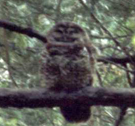New The Outdoorsman Is Excellent
The previous two posts were extracted (with generous permission) from articles appearing in the new issue of The Outdoorsman, No. 35, July-Nov 2009 [here]. The Outdoorsman is written and edited by Mr. George Dovel [here].
The new issue is excellent, as usual. Looking back, we have posted excerpts from six? previous issues [here, here, here, here, here, here] at least. We highly value and appreciate Mr. Dovel’s work and voice.
Another article (beside the two we posted) printed in the new The Outdoorsman is “When Biologists Stocked Alaska with Wolves” by Ned Rozell of the Geophysical Institute, University of Alaska Fairbanks.
Rozell discusses the “predator pit” that resulted from the 1960 release of a mating pair of wolves onto Coronation Island, a remote 45-square-mile island exposed to the open Pacific. Prior to the release, Coronation Island had a high density of blacktailed deer and no wolves. By 1965 at least 13 wolves lived on the island and three litters of young had been born since the first wolves had arrived. Few deer remained. By 1966 only signs were found of 3 deer and one wolf. By 1983 researchers found no evidence of wolves, and the deer were once again plentiful.
Another article is “Let’s Get Real” by Dr. Valerius Geist, about the myth of the “harmless wolf”. Dr. Geist is the undisputed authority on North American big game species, and many of his essays have also been posted at Wildlife and People [here].
Another article is “The Rest of the Story” by George Dovel in which he discusses predator-prey relationships and the myth of the “balance of nature”.
… In his article “Vancouver Island Wolves,” (see April-May 2006 Outdoorsman) Dr. Geist described how, when wolves entered Vancouver Island during the 1970s, the annual deer kill by hunters plummeted from about 25,000 to less than 4,000. Are we to believe that Vancouver Island’s 12,076 square-mile area is, like Alaska’s Coronation Island, also supposedly “too small for both deer and wolves?”
In both cases, with an abundance of deer to kill and eat, the wolves multiplied much faster than the deer and soon depleted their numbers. When the wolves on Coronation Island killed off most of the black-tailed deer and exhausted the supply of other prey they starved and the deer eventually recovered.
But, as Dr. Geist explained in “Vancouver Island Wolves,” after the wolves killed off most of the black-tailed deer and smaller prey, they survived on alternate prey, including elk, livestock and domestic animals and pets. These wolves also continue to kill pockets of deer thereby preventing recovery of the deer population. …
In geographically “closed” ecosystems such as Coronation Island and Isle Royale, a single large carnivore species decimates its single wild ungulate prey and ultimately destroys itself, allowing the prey to repopulate over time. But in the vast majority of ecosystems such as Vancouver Island and Interior Alaska, where alternate prey species allow predators to survive after the primary prey is decimated, the primary prey may not recover without a dramatic reduction in predator numbers. …
That is the situation throughout much of Alaska today and it resulted from pandering to propagandists who were allowed to promote the myth that predators and their prey will seek and maintain a “natural” balance. …
In the lower 48 States, pretending to manage ecosystems rather than actively manage wildlife populations can only result in decades of starvation, disease and scarcity in between the occasional rare “balance” that may appear to exist briefly. At a time when our federal government is promoting sustainable communities and the use of renewable natural resources, promoting the wanton destruction of our renewable timber and wildlife resources is inexcusable.
Please read the (free online) newest issue of The Outdoorsman [here]. You may also wish to send George Dovel a donation for his important and valuable efforts (see the last page of The Outdoorsman).
by YPmule

I highly recommend reading all of George’s articles. Very enlightening.
Thanks!